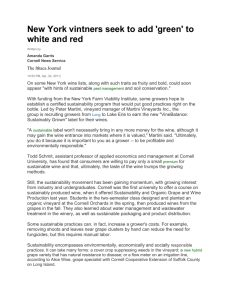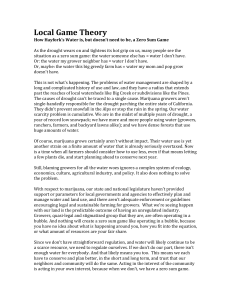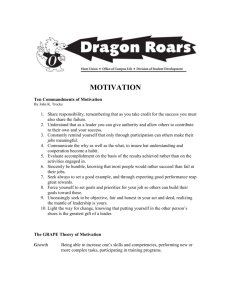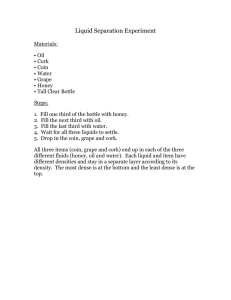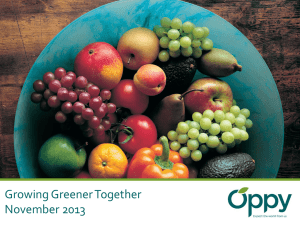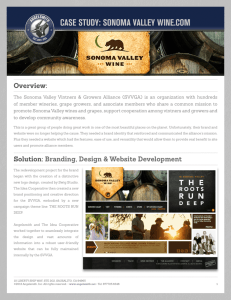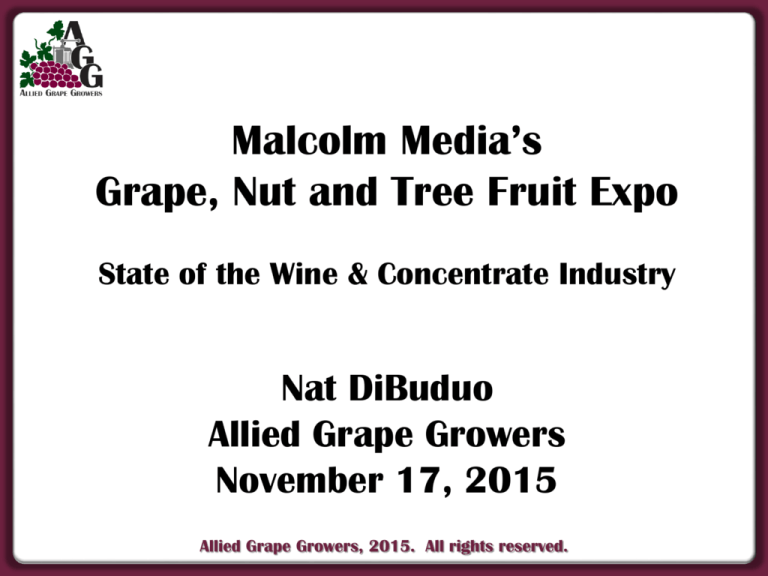
Malcolm Media’s
Grape, Nut and Tree Fruit Expo
State of the Wine & Concentrate Industry
Nat DiBuduo
Allied Grape Growers
November 17, 2015
Allied Grape Growers, 2015. All rights reserved.
Four Part Presentation
•Part 1: A look at California Supply
•Production trends
•Acreage forecasts
•Part 2: What Happened with the 2015 Harvest?
•What’s a grower to do?
•Part 3: Pros & Cons of the Industry
•Part 4: Understanding and Managing Market Risk
Allied Grape Growers, 2015. All rights reserved.
Part 1:
A look at supply
Allied Grape Growers, 2015. All rights reserved.
A look at supply
Allied Grape Growers, 2015. All rights reserved.
A look at supply Lots of moving parts
Factors affecting crop size as compared to last year:
• Mother Nature – Shorter Crop
• Off 20-25% in the coast
• Off less than 10% in the interior
• New Plantings
• Added 30-35K bearing acres from 2012
plantings (3 years non-bearing assumed)
• Newer plantings producing more each year
• Vineyards Removals (Predominantly Interior)
• Removed 25,000 winegrape acres in 2015
Allied Grape Growers, 2015. All rights reserved.
A look at supply
Winegrape tons crushed, 2009-2014
Region
Lodi/Clarksburg
Central Interior
Total all Interior
2009
2010
2011
2012
2013
2014
906,949
705,066
682,617
916,138
949,591
814,894
1,738,182 1,831,629 1,803,818 1,884,293 2,026,212 1,882,299
2,645,131 2,536,695 2,486,435 2,800,431 2,975,803 2,697,193
• Six-year average = 2,690,281 tons
• In 2014 we were right at our six-year average, but that was with
record-breaking bearing acreage. In reality, yields were light.
• For 2015, we see yields similar to 2014 (below average)
Allied Grape Growers, 2015. All rights reserved.
A look at supply
AGG Winegrape Acreage Estimates
Bearing
Non-Bearing Total
2014
555,000
100,000
655,000
2015
562,000
90,000*
652,000
*2015 non-bearing acreage includes an assumption that
approximately 20,000 acres were planted this year.
Allied Grape Growers, 2015. All rights reserved.
A look at supply
Allied Grape Growers, 2015. All rights reserved.
A look at supply
Range of Potential California Winegrape
Acres Planted Based on Annual Vine Sales
45,000
40,000
35,000
30,000
25,000
20,000
15,000
10,000
5,000
-
2010
2011
2012
2013
Allied Grape Growers, 2015. All rights reserved.
2014
Segmenting the Business
Segment Allocation of Winegrape Vines Sold, 2012-2014
30 Million
27 Million
30,000,000
24 Million
25,000,000
20,000,000
High
Mid
Value
15,000,000
Higher
emphasis
in Northern
Interior
10,000,000
5,000,000
Major
concentration
in Northern
Interior
2012
2013
2014
Allied Grape Growers, 2015. All rights reserved.
Supply Potential - All Wine
Est. California Winegrape Bearing Acres, 2013-2017
350,000
Includes 2% Coastal Attrition Rate
and 6% Interior Attrition Rate
-1% 1% 0%
300,000
250,000
200,000
6% 6% 5%
150,000
1% 2% 2%
100,000
50,000
-
High
2013
Mid
2014
2015
Value
2016
2017
Allied Grape Growers, 2015. All rights reserved.
Segmenting the Business
<$10
>$10
Essentially, the
California Coast Range
is the geographic line
that represents the
+/- $10/bottle pivot
point in the market.
= <$10
= $10-20
= >$20
Allied Grape Growers, 2015. All rights reserved.
Segmenting the Business
Bottle Prices:
Less than $10 / $10-20 / and above $20
• <$10 – Everyday Wines – (The “Value” Category)
• The backbone of the industry
• Highly competitive (not only within the wine business, but
among competing beverage industries)
• The bottom end of this segment has been declining in volume
for decades
• Generally characterized by higher volume/lower margin
• Limited differentiation
• Lower portions of this segment may exist due to oversupplies
of wine worldwide
• Competing interest – production agriculture
• Geographically – the interior regions
• (Grapes <$1,000/ton)
Allied Grape Growers, 2015. All rights reserved.
Part 2:
What happened with
the 2015 harvest?
Allied Grape Growers, 2015. All rights reserved.
The 2015 Harvest
•
•
•
•
•
•
Buyers (or lack thereof)
Pricing
Crop size
Late season buying
Sustainability
What’s a grower to do?
Allied Grape Growers, 2015. All rights reserved.
The 2015 Harvest
Buyers (or lack thereof)
•
•
•
•
•
Many buyers walked away from growers whose
contracts ended after the 2014 harvest.
Buyers lamented that the 2012, 2013 & 2014
crops were so large they had plenty of bulk wine
inventory and could buy wine on the bulk market.
The financial departments put a hold on buying
grapes.
They could buy bulk / bottled imported wine
cheaper then we could sustainably produce it.
Some even suggested skipping a year.
Allied Grape Growers, 2015. All rights reserved.
The 2015 Harvest
Pricing
•
•
•
•
Those with existing contracts were mostly paid
the minimum price in the contract.
Those who had no contracts were subject to the
spot market prices.
Some buyers were willing to pay the equivalent
of their minimum prices, but most weren’t.
Thompson Seedless spot market pricing was
unsustainable.
Allied Grape Growers, 2015. All rights reserved.
The 2015 Harvest
Crop Size
•
•
•
•
Overall the SJV crop was somewhat below
average, depending on variety.
Thompson Seedless yields were above average
and larger than the 2014 crop.
New plantings added to the amount of
winegrapes harvested in 2015.
Compared to growers on the North & Central
Coast, the SJV had a fair crop size; but we
didn’t have their prices!
Allied Grape Growers, 2015. All rights reserved.
The 2015 Harvest
Late Season Buying
•
•
•
Many winegrapes were purchased under the
guise of brandy and/or distillery use.
Buying was anywhere from $100/ton roadside
to $250/ton delivered
Spot prices were unsustainable for growers.
Allied Grape Growers, 2015. All rights reserved.
The 2015 Harvest
Sustainability (Economic)
•
•
•
•
SJV growers have provided grapes for decades to wineries
that provide wine at various price points and quality to a
vast consumer base.
To continue, growers need to earn a fair living and profit
from their vineyards; be economically sustainable.
To be sustainable, a grower should expect his vineyard to
have a combination of sufficient production & a fair price.
Farmers are good stewards of their labor force, the land
they work & live on, the environment and their communities.
We are farming “sustainably” whether we document it or
not!
Allied Grape Growers, 2015. All rights reserved.
What’s a Grower to do?
• Vineyard Evaluation
• Know what your average production level is! Be honest with
yourself.
• Know what your true costs of production - not only per acre,
but per tons produced.
• Know what your average price per ton has been then factor in
the new paradigm of SJV winegrape pricing.
• Evaluate the alternatives you have
• What alternative crops can you grow on your land taking into
account development costs & timing, water, gross & net per
acre.
• Check with a reliable appraiser or real estate agent on the
true value and marketability of your vineyard. The current real
estate market is high and of questionable sustainability.
Allied Grape Growers, 2015. All rights reserved.
What’s a Grower to Do?
We have observed many new
plantings statewide, BUT………..
Allied Grape Growers, 2015. All rights reserved.
What’s a Grower to Do?
……now we see significant removals in the interior.
Allied Grape Growers, 2015. All rights reserved.
What’s a Grower to do?
• Vineyard Removals
• It is primarily a SJV phenomenon. Some redevelopment in
the coastal areas.
• It may be a very tough decision based on vineyard age &
variety.
• In most cases the ground is not being replanted to grapes.
• Removal Data – From Observation and Public Records
• 35,000+ grape acres (25,000+ winegrapes) are estimated
to have been pulled out since the 2014 harvest.
• During the months of September & October the amount of
vineyard removals increased by 50% over the previous year.
• It is likely removals will continue at the current pace thru
Spring (weather allowing), as growers continue to evaluate
& plan to plant alternative crops.
Allied Grape Growers, 2015. All rights reserved.
What’s a Grower to Do?
Allied Grape Growers, 2015. All rights reserved.
What’s a Grower to Do?
Let’s not be afraid of
our own shadow….or
making tough decisions!
Allied Grape Growers, 2015. All rights reserved.
What’s a Grower to Do?
Allied Grape Growers
• Is a raisin grape & winegrape marketing
cooperative
• We are in the business of representing grape
growers
• We are in the business of selling grapes to wineries
and concentrate providers
• We are not in the nut business
• We are NOT telling anyone to remove or sell their
economically sustainable vineyards.
• We are telling growers to be smart businessmen
and assure your future and the future of your
families!
Allied Grape Growers, 2015. All rights reserved.
Part 3:
Pros and cons
In the business
Allied Grape Growers, 2015. All rights reserved.
Pros and Cons in the business
• The economy
• Foreign competition
• Consumption trends
Allied Grape Growers, 2015. All rights reserved.
Pros and Cons in the Business
The Economy
Allied Grape Growers, 2015. All rights reserved.
California Wine Shipment Volume
Shown in millions of cases shipped, 1980-2014
Recession directly affects the
wine business categorically.
69.7
45.9
66.6
30.8
Graph Source: The Gomberg Fredrikson Report - 2014 Annual Wine Industry Review
Allied Grape Growers, 2015. All rights reserved.
Pros and Cons in the Business
Foreign Competition
Allied Grape Growers, 2015. All rights reserved.
Pros and Cons in the Business
Foreign Competition
+23%
+30%
+20%
Allied Grape Growers, 2015. All rights reserved.
Pros and Cons in the Business
Consumption and Categorical Competition
Allied Grape Growers, 2015. All rights reserved.
Pros and Cons in the Business
Consumption Trends
Allied Grape Growers, 2015. All rights reserved.
Pros and Cons in the Business
Consumption Trends
Allied Grape Growers, 2015. All rights reserved.
Pros and Cons in the Business
Consumption Trends
“Millennials generally drink more premium
wine than the typical US wine consumer, but
they are not yet the core consumers of
ultra-premium wines. The sweet spot of
millennial consumption appears to be the
$10-25/bottle range.”
- Stephen Rannekleiv Rabobank Beverage Industry Analyst
Allied Grape Growers, 2015. All rights reserved.
Pros and Cons in the Business
Consumption Trends
Allied Grape Growers, 2015. All rights reserved.
Pros and Cons in the Business
Consumption Trends
Cases
(in Millions)
Est. California Table Wine Volume <$7/Bottle, 2006-2014
140.0
120.0
106.8 107.2
113.2
117.0 118.1
123.9 122.8
118.0
115.6
100.0
80.0
60.0
40.0
20.0
0.0
2006
2007
2008
2009
2010
2011
2012
2013
Allied Grape Growers, 2015. All rights reserved.
Data Source: Gomberg Fredrikson Report
2014
Part 4:
Understanding and
Managing Market Risk
Allied Grape Growers, 2015. All rights reserved.
Understanding/Managing Risk
What creates market risk?
OVERSUPPLY
-Either from a supply/demand imbalance
caused by a multi-year, longer term issue
Or from a large crop or series of large crops
(generally a shorter term issue)
Allied Grape Growers, 2015. All rights reserved.
Understanding/Managing Risk
Some Closing Comments
• Different Varieties & Relationships
• Planting contracts dictate what to plant, but consider your current
mix of varieties as well as who you sell to.
• Little to no Central SJV planting contracts are currently being
offered.
• Ask your buyer if they would like the SJV grower to be available for
them in the future and how do to develop a partnership with them
to remain viable.
• Different Crops
• Evaluate your property for suitability of alternative crops.
• Different Options
• Do you want to continue farming? Do you want to consider leasing
your vineyard or maybe even selling it & retiring?
• Different Landscape of the SJV in the future?
Allied Grape Growers, 2015. All rights reserved.
What’s a Grower to Do?
Allied Grape Growers
• Is a raisin grape & winegrape marketing
cooperative
• We are in the business of representing grape
growers
• We are in the business of selling grapes to wineries
and concentrate providers
• We are not in the nut business
• We are NOT telling anyone to remove or sell their
economically sustainable vineyards.
• We are telling growers to be smart businessmen
and assure your future and the future of your
families!
Allied Grape Growers, 2015. All rights reserved.
In Summary
Market growth is currently at the
upper end of the market. This is
a prime opportunity to
differentiate “California” and
move up the price ladder; not
just for the interior, but for all
production areas of the state.
Allied Grape Growers, 2015. All rights reserved.
Please visit us at:
alliedgrapegrowers.org
Allied Grape Growers, 2015. All rights reserved.

